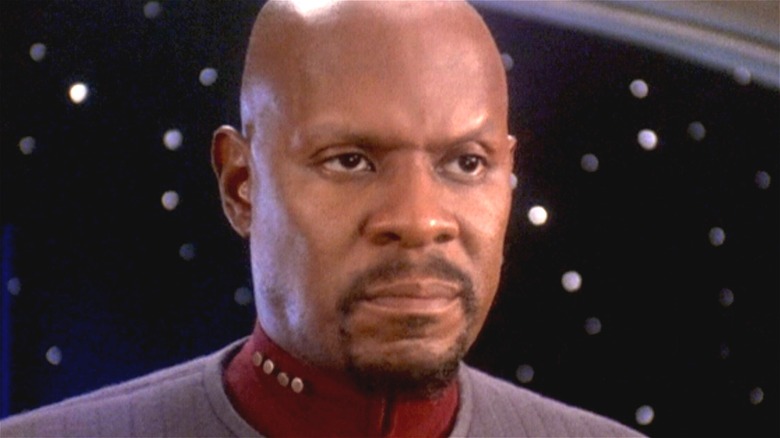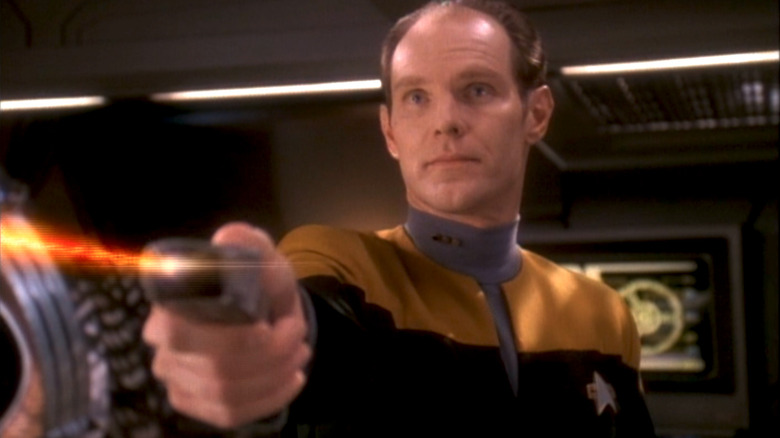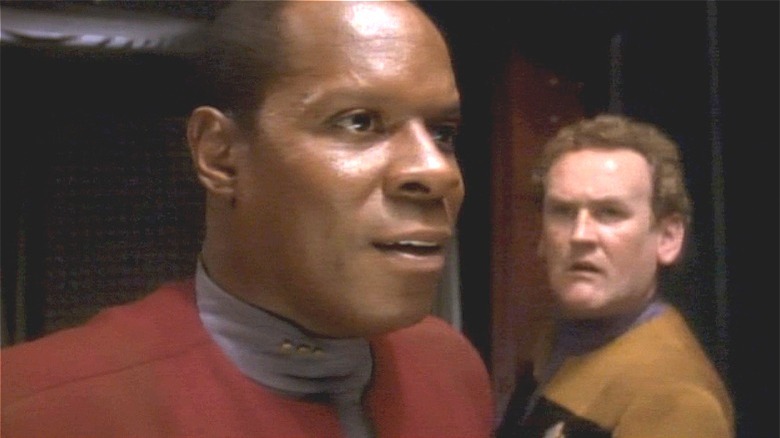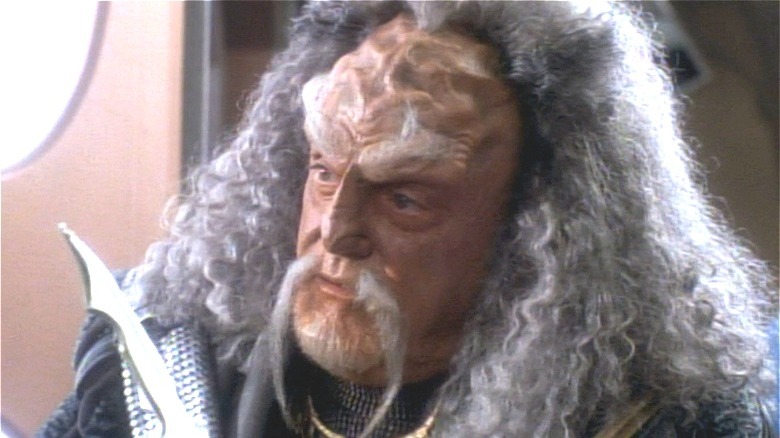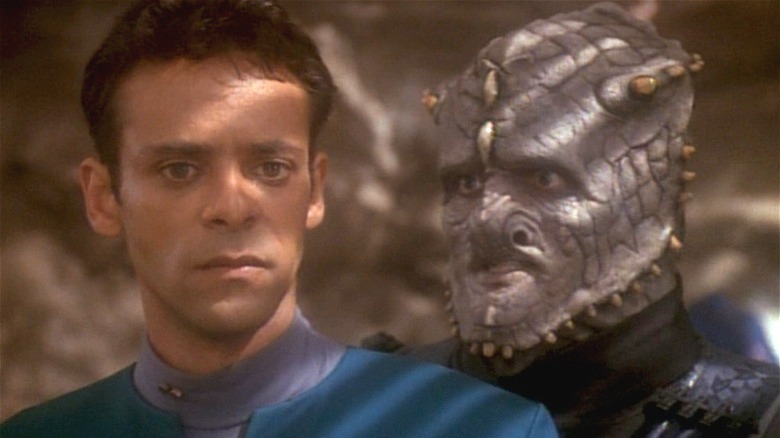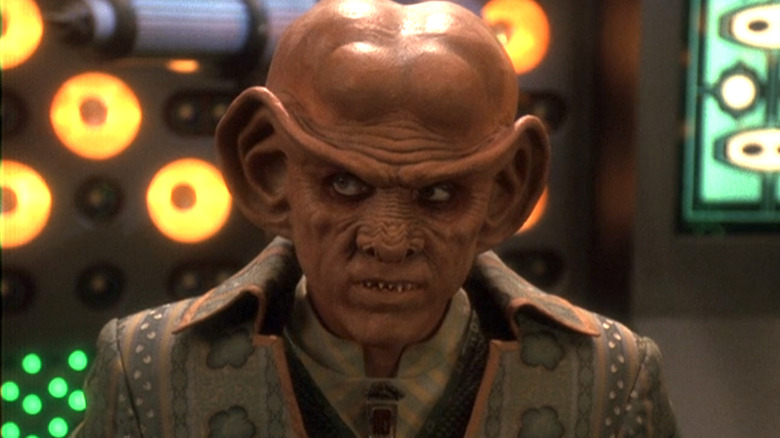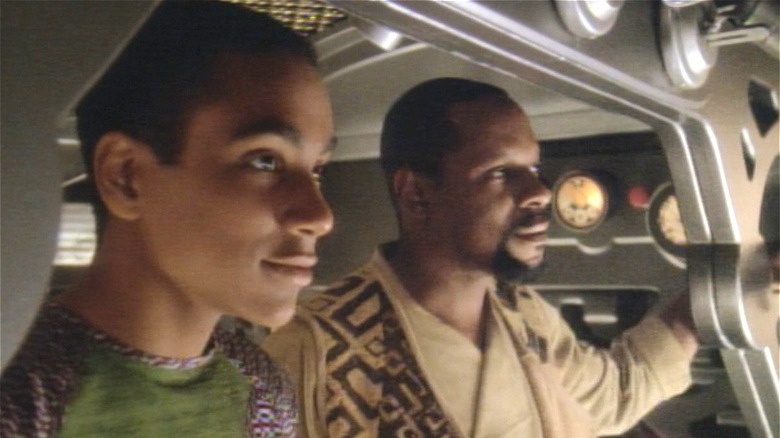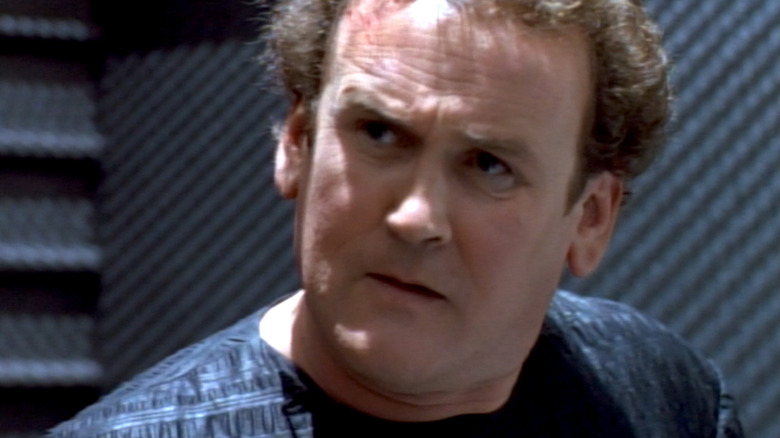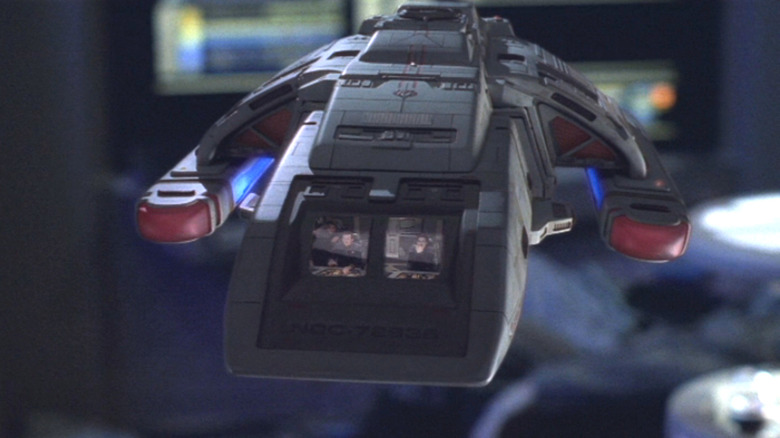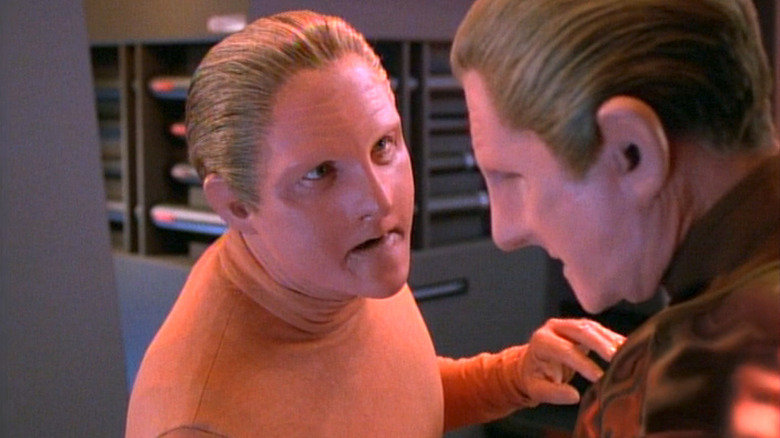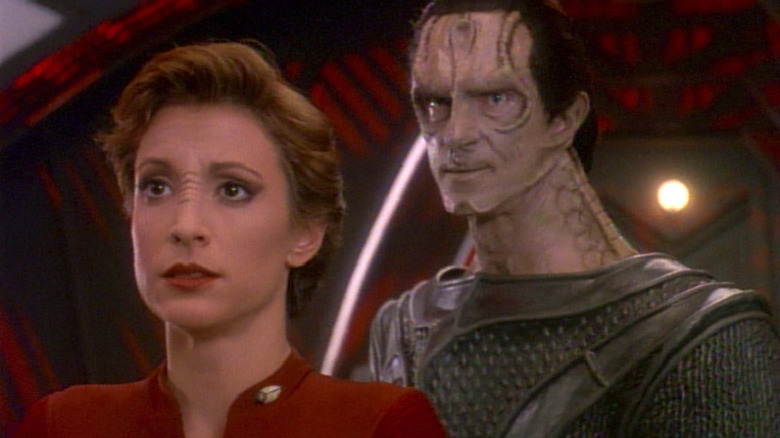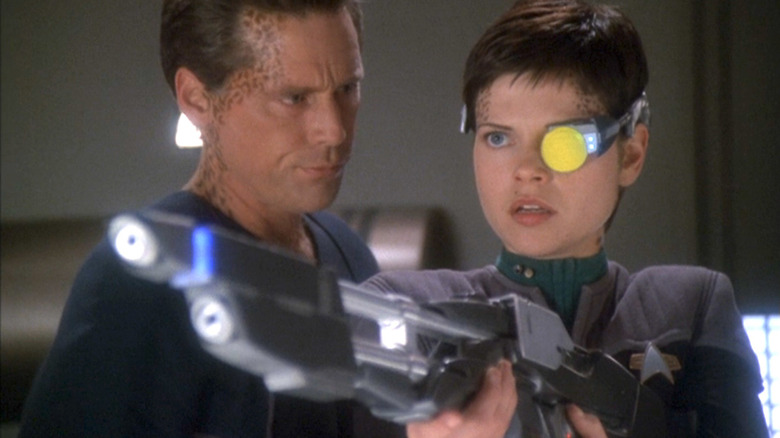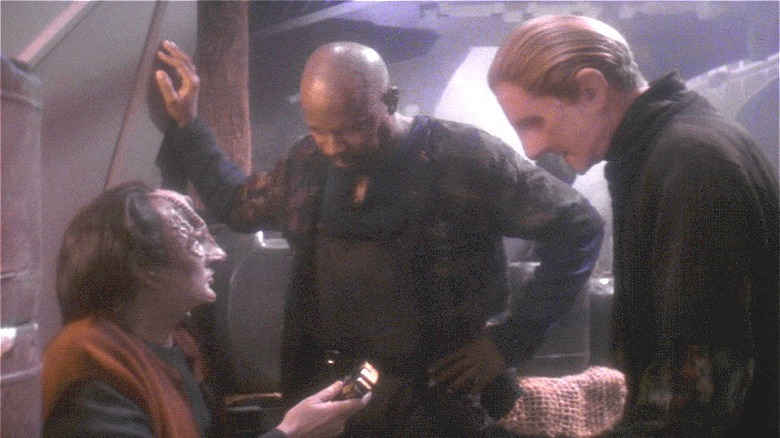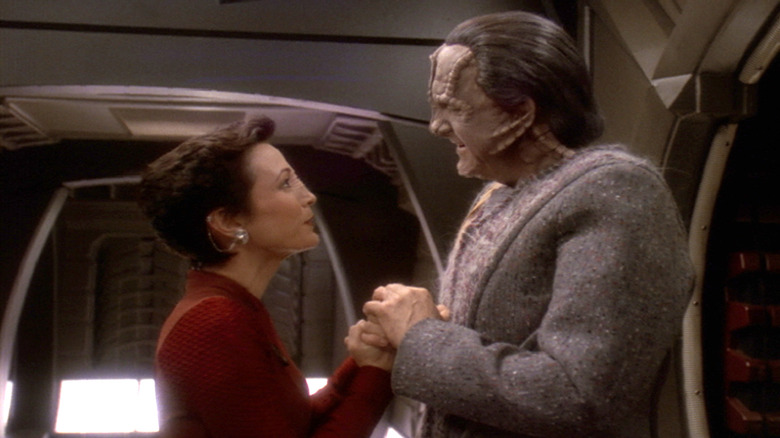The Most Underrated Episodes Of Star Trek: Deep Space Nine
Often thought of as the step-child of "Star Trek," the spin-off series "Deep Space Nine" was sandwiched between the more successful "The Next Generation" and the more talked-about "Voyager." However, over the years, audiences have rediscovered the greatness of "DS9" thanks to streaming. Many people are now appreciating it for its dark moral tales, serialized story, and complex characters.
"Deep Space Nine" boasts a unique cast of characters that are a vast departure from the upstanding Starfleet officers previously seen on the Enterprise. A disillusioned commander, a 700-year-old symbiont, a former freedom fighter, and a conniving bartender all roam the space station. This grittier series contains some of the best episodes "Star Trek" has ever seen, including the heartbreaking family tale "The Visitor," and the political thriller "In the Pale Moonlight."
There are dozens more episodes that deserve their due, ones that are all too often overlooked in "best of" lists. We're here to shine a spotlight on these underrated gems.
For the Cause (Season 4, Episode 21)
"Deep Space Nine" has become known for strong recurring characters like Starfleet security officer Michael Eddington, introduced in Season 3 as a potential rival for Odo. The onset of the Dominion War likely led some fans to suspect he was actually a changeling infiltrator, but "For the Cause" proved that theory wrong.
In this episode, Eddington and Odo believe that a Maquis agent is planning to hijack a shipment of valuable technology headed for war-torn Cardassia, and they suspect that it may be Sisko's new girlfriend Kasidy Yates. Sisko reluctantly agrees to let them monitor her activities, but it's soon revealed that she was only a distraction. Eddington himself is the Maquis operative, and this reveal kicks off a subplot that sees Sisko obsessed with hunting him down for betraying Starfleet.
Though episodes like "In the Pale Moonlight" became the show's most highly rated for dealing with moral complexities, "For the Cause" did it nearly as well, a thrilling story with plenty of twists and turns. It raises interesting questions in light of Sisko's later actions in the series, and Eddington's behavior ignites a lively debate on the morality of war.
Civil Defense (Season 3, Episode 7)
Despite the reputation of "Deep Space Nine" as a more serialized series, it contains a few standalone bottle episodes that are worthy of your time, like the Season 3 installment "Civil Defense." Set entirely aboard the former Cardassian station, it turns Deep Space Nine itself into the crew's enemy.
The episode begins with Sisko, O'Brien, and Jake in the bowels of the station working to retrofit a facility once used by Cardassians for ore processing. While deleting old files from the system computer, they inadvertently trigger an old security protocol that makes the station believe its former Bajoran slave force is revolting. As the station itself turns against them — with deadly gas and other hazards meant to thwart an uprising — every action they take seems to make things work. With the station threatening to self-destruct they are forced to ask for Dukat's help to avert disaster, but the price for his cooperation may be too steep to pay.
A satisfying story that puts the crew in mortal danger and provides problem after problem to solve, this is pure "Star Trek." There are no stunning revelations or moral issues to consider, but "Civil Defense" is a fun, tension-riddled adventure all the same.
Blood Oath (Season 2, Episode 19)
The addition of Worf to the series in Season 4 meant plenty of stellar Klingon episodes through the rest of the show's run. Several such episodes went on to become fan favorites, but the show's finest Klingon-centric episode may in fact be the pre-Worf "Blood Oath." It's an exciting story of revenge that unexpectedly brings back three Klingon characters not seen in live action since the original "Star Trek" series.
The episode sees Kang from "The Day of the Dove," Kor from "Errand of Mercy," and Koloth from "The Trouble with Tribbles" reuniting — in updated make-up — for a quest to hunt an old rival. Decades before, a villain called the Albino killed each of their first born sons and they swore a blood oath to one day get revenge. All three arrive on "Deep Space Nine" to find Curzon because they have finally located the Albino. But, with Jadzia now the host to the Dax symbiont, they are uncertain if she should be allowed to join their quest.
The surprise return of Kang, Kor, and Koloth proved not just crowd-pleasing, but rewarding too, giving new insight into Dax's past. Kor returned several more times in the series, later joining Worf and Dax on another quest in "The Sword of Kahless."
Hippocratic Oath (Season 4, Episode 3)
Julian Bashir started the series as a wide-eyed and optimistic young doctor who was looking to practice medicine on the frontier. Excited and eager to explore strange new worlds in the Gamma Quadrant, he was at the center of several standouts stories like "Inquisition," which kicked-off the multi-episode storyline that introduced Section 31 to "Star Trek." But the best episode to explore Bashir the man is often overlooked: Season 4's "Hippocratic Oath."
While Bashir and O'Brien are aboard a runabout, they come across a planet where they find a Jem'Hadar ship. Taken captive, they fear they'll be executed, but the Jem'Hadar commander Goran'Agar has an unusual task for Bashir: Find a way to free his men from their addiction to Ketracel-white, the drug that The Founders use to control them. Bound by his oath to help those in need, Bashir tries to discover how the chemical works and how the Jem'Hadar could be released from their dependency. However, O'Brien wants to do nothing but escape, unwilling to help the enemy in any way, putting the two friends at odds.
"Deep Space Nine" often forces audiences to examine the root of hatred towards enemies, with ideological conflicts at the center of several episodes. In "Hippocratic Oath," O'Brien and Bashir clash over the ultimate ethical test, and viewers are forced to reconsider the most vicious alien race the franchise has ever produced.
Business as Usual (Season 5, Episode 18)
More humorous "Deep Space Nine" episodes are centered on the station's resident Ferengi, bar owner Quark. The beloved installment "Little Green Men" is among the show's very best, but there's another Quark-centered story that gets little love. That's probably because the underrated "Business As Usual" is a surprisingly serious story, one that sends Quark into a moral crisis.
On the verge of financial ruin, Quark receives an offer from his cousin Gaila that he can't refuse: Join him in his business as an arms dealer. The job offers him fantastic riches, but loses him the friendship of his closest friends on the station. At first, he's thrilled to be raking in the latinum, but he soon has second thoughts when a client turns out to be a tyrant looking to wipe out millions of lives. His new benefactor, the charismatic but dangerous Hagath, won't let him quit, and he fears he may have to lose his life if he wants to keep his conscience.
With some of the series' best guest performances, the episode puts Quark through the wringer and once and for all proves that he's not the morally bankrupt con artist he is often portrayed as.
Explorers (Season 3, Episode 22)
One of the last episodes to center on Captain Sisko and his son Jake prior to the Dominion dominating the remainder of the series, the under-appreciated Season 3 entry "Explorers" is a story of family, and the perfect example of what makes "Deep Space Nine" so special. Though it might not be as emotionally heart-wrenching as the iconic fourth season episode "The Visitor," it's still a fun installment that shows the deep bond between Sisko and Jake. It also proves that "Star Trek" can make great episodes even with relatively low stakes.
During a bit of downtime, Sisko pursues a passion project, using historical records to reconstruct an ancient Bajoran solar sailing ship. Once built, he hopes to use it to prove that the ancient Bajorans could have made the long journey to Cardassia without the use of warp drive. Looking to use the project as a way of spending more time with his son, he convinces Jake to tag along, even though the aspiring author would rather be working on his writing.
In addition to being a touching father-son tale, "Explorers" also pushes forward the ongoing story of Sisko's connection to Bajor, as his interest in their history and culture comes to the fore. The only thing holding this one back from becoming a classic is an awkward subplot centered on Bashir reconnecting with an old Academy friend that doesn't quite measure up to the strength of the episode's central story.
Tribunal (Season 2, Episode 25)
The everyman of "Star Trek," O'Brien went from stalwart crew member on "The Next Generation" to the writer's favorite punching bag on "Deep Space Nine" thanks to his lovable, sympathetic demeanor. O'Brien gets raked over the coals in some of the series' best episodes, like "Hard Time," "The Visionary," and "The Assignment." But one of the most underrated O'Brien episodes that saw him tortured and abused is Season 2's "Tribunal."
A sequel of sorts to the "TNG" episode "The Wounded," this episode further explores O'Brien's time fighting in the Cardassian Wars and his bias against the antagonistic alien race. It begins when he meets an old fellow soldier from his time in the war, Raymond Boone, just before leaving the station for a vacation with his wife Keiko. While on their way, O'Brien is scooped up by a Cardassian warship and accused of plotting a deadly bombing. When Sisko and the crew realize that the Cardassians are planning an elaborate show trial, Odo discovers that there's more to the allegations than meets the eye.
This is one of the finest and most underrated trial episodes in "Star Trek" history. With a memorable guest appearance from TV legend Fritz Weaver and powerful performances from René Auberjonois and Rosalind Chao, "Tribunal" is an effective political thriller that cuts deep.
One Little Ship (Season 6, Episode 14)
Though known for its seriousness, "Deep Space Nine" contains plenty of light-hearted romps. A great example is the Season 6 adventure "One Little Ship." In the midst of the carnage of the Dominion War, the series manages to tell a playful story seemingly inspired by the classic sci-fi adventure "Fantastic Voyage."
While investigating a unique phenomenon that shrinks a runabout to the size of a Hot Wheels car, the USS Defiant comes under attack from the Jem'Hadar. The Defiant's crew is taken hostage and the ship overrun by the Jem'Hadar. While the crew is forced to operate the ship at gunpoint, Sisko attempts a risky plan to retake it by pitting two Jem'Hadar commanders against each other. With the odds against them, it's up to the tiny runabout and it's pint-sized crew to save the day.
Despite its silly premise, "One Little Ship" isn't all fun and games. There's plenty of real danger and suspense as the crew fights back, and the miniaturized officers race against the clock to save the Defiant from destruction. The power struggle between the two enemy commanders is also an interesting dynamic, and gives added insight into the vaunted Dominion.
The Adversary (Season 3, Episode 26)
The Season 3 premiere "The Search" is one of the best "Deep Space Nine" episodes according to IMDb, but that season's finale, "The Adversary" might be even better. The third year of the show saw some dramatic escalations as the Dominion became a major threat, and it all came to a head in the Season 3 capper. Though not the kind of true cliffhanger that "Star Trek" fans had grown used to on "The Next Generation," it closed out the year on a terrifying note, with a dark portent of things to come.
A classic submarine thriller in the finest "Star Trek" tradition, it begins with Sisko taking the Defiant on a mission to the Federation border with the Tzenkethi. An unknown saboteur locks the crew out of the ship's systems and sends the Defiant barreling into enemy territory. While looking for answers, the crew discovers there's a Dominion infiltrator aboard the ship, a shape-shifter disguised as one of them. Now they must uncover the enemy agent and regain control of the ship before they cross into Tzenkethi space.
Odo finds himself in a life or death struggle with one of his own kind in this episode. The stakes are high — no matter what happens, the Federation is looking at an all-out war, either with the Tzenkethi or the Dominion. "The Adversary" is both an important episode and one of the most underrated.
Return to Grace (Season 4, Episode 13)
When war with the Klingons breaks out in Season 4, it seems like the entire focus is going to shift towards new cast member Worf. But, while Klingons do play a bigger part in the series that season, they are also used to great effect in episodes centered on other characters. The most underrated of these is "Return to Grace," an episode that shows a different side to the series' main antagonist, Dukat.
Following the episode "Indiscretion," Dukat finds himself demoted and captaining a lowly freighter, with his newfound half-Bajoran daughter — the ill-fated Ziyal — by his side. When he survives an attack by a Klingon Bird of Prey, he makes it his mission to do what his superiors won't: Hunt down the Klingons. Despite her better judgment, Major Kira teaches him the tactics she used to defeat the Cardassians during the Occupation, and the two team up on a mission to strike back at the Klingons who wronged him.
He's one of the show's most complex characters, and Dukat's multifaceted nature takes center stage in "Return to Grace." It's also a fascinating exploration of Major Kira, whose disgust for Dukat is tempered by her mother-like relationship with his daughter Ziyal. Among Dukat's finest and most underrated showings, the episode once again shows the complicated nature of the show's best villain while also introducing the recurring character Damar.
Field of Fire (Season 7, Episode 13)
Perhaps the most underrated "Deep Space Nine" episode, nobody ever talks about "Field of Fire." With nail-biting suspense and pulse-pounding plot twists, it's an edge-of-your-seat crime drama the likes of which "Star Trek" has rarely seen. This psychological thriller is a sequel of sorts to Season 2's "Equilibrium," the episode that introduced Juran, a past host of the Dax symbiont.
"Field of Fire" opens with the shocking murder of a young Starfleet officer after a night out celebrating his transfer to Deep Space Nine. During the initial examination of the murder scene it's discovered that the victim was killed not with a phaser, but with a primitive projectile weapon. Having been the last person to see the young man alive, Ezri becomes obsessed with finding the person responsible. To do so, she'll need the help of Juran Dax, a dangerous homicidal killer who has been buried in her psyche for decades. But, while Juran offers valuable insight that helps her track down the murderer, he also brings her perilously close to becoming a killer herself.
Joining the show in its final season, Ezri Dax only got a year on "DS9." "Field of Fire" is her finest hour: Not only is it a brilliant mystery, but, with the normally nervous Ezri finding a way to connect with Juran, it proves that she is just as capable as any of her previous hosts.
Things Past (Season 5, Episode 8)
Odo is one of the most complex characters in "Deep Space Nine." He's often shown as a deeply conflicted character of high moral integrity, and his beginnings as a misunderstood lab experiment mean he has a tragic origin. His past is the subject of the criminally underrated episode "Things Past."
In the episode, Sisko, Odo, Garak, and Dax are hurled back in time seven years and find themselves aboard Terek Nor, a Cardassian slave labor facility during the Occupation of Bajor. They appear to be trapped in the bodies of a group Bajorans who were wrongly convicted and executed for an assassination attempt on Bajor's Prefect, Gul Dukat. The more they learn about their surroundings, the more they realize that something is very wrong, including the presence of a Cardassian investigator who history says shouldn't be there. To uncover the truth, Odo must confront the ghosts of his past, but if he's not careful they could all wind up dead.
Like the highly rated entry "Necessary Evil," we learn more of Odo's backstory with an old case that changes the way we see him. "Things Past" infuses the story with a few nice twists and surprises along the way.
Ties of Blood and Water (Season 5, Episode 19)
The Season 3 episode "Second Skin" is a favorite of fans who love Major Kira Nerys. It sees enemy agents attempting to convince her that she's actually the daughter of a prominent Cardassian politician named Tekeny Ghemor, and that her entire life as a Bajoran is a lie. In the end, it was all revealed to be a ruse to expose Ghemor's allegiance to a group of dissidents. In "Ties of Blood and Water," we learn that Kira and Ghemor have stayed in touch, with the Major seeing the elder Cardassian as a father figure.
Arriving on the station, Ghemor reveals that he is dying, and — in accordance with Cardassian tradition — he must spend his final days revealing his life's secrets to those closest to him. He chooses to bear his soul to Kira, who initially views it as a military debriefing. But, as Ghemor begins to open up, it becomes much more than that. Meanwhile, Dukat and the Dominion plot to have Ghemor assassinated, fearing what damage his secrets could do. When Kira discovers that Ghemor was responsible for a horrific atrocity during the Bajoran Occupation, she realizes that he might not be the man she thought he was.
One of the most powerful arcs in "Deep Space Nine" was Major Kira moving past her hatred of Cardassians. "Ties of Blood and Water," though overlooked by many, remains an important part of that story, an episode that illustrates the power of forgiveness.
